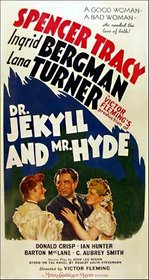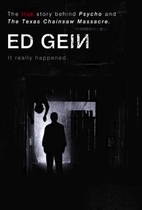Our editor-in-chief Nate Yapp is proud to have contributed to the new book Hidden Horror: A Celebration of 101 Underrated and Overlooked Fright Flicks, edited by Aaron Christensen. Another contributors include Anthony Timpone, B.J. Colangelo, Dave Alexander, Classic-Horror.com's own Robert C. Ring and John W. Bowen. Pick up a copy today from Amazon.com!
Dr. Jekyll and Mr. Hyde (1941)
With an Oscar-winning director, a two-time Oscar-winner in the title role, and a number of future Oscar winners and nominees in the supporting cast, Metro-Goldwyn-Mayer's lavish 1941 adaptation of Dr. Jekyll and Mr. Hyde suffers from a surfeit of class. While director Victor Fleming creates a very literary-minded film, he misses the point of making a horror movie, removing much of the sadism and sordidness necessary to make Robert Louis Stevenson's story play well in the cinematic medium. Instead, we're left with something that's pretty, but ultimately hollow. Stripped of its dark underbelly, Dr. Jekyll and Mr. Hyde leaves us with the feeling that, despite this all-star team, the results could have been much better.
Practically a scene-by-scene remake of Rouben Maumoulian's 1931 version, Dr. Jekyll and Mr. Hyde '41 concerns Dr. Harry Jekyll (Spencer Tracy), a renowned physician working on a method to divide the good and evil halves of man. When he is unable to find a test subject for his controversial experiments, he uses himself as a guinea pig, drinking a potion that transforms him into the surly, cruel Mr. Edward Hyde. Hyde creates mischief throughout London before settling on terrorizing Ivy (Ingrid Bergman), a destitute barmaid. As Hyde's inhumanities escalate, Jekyll finds himself losing control over his alter ego.
Spencer Tracy's Mr. Hyde is approached as a psychological construct -- the darkness that comes out when accountability is removed. The makeup used to transform Tracy into Hyde is subtle -- his eyebrows are dark and scraggly, his hair oily and slicked back, and his face "uglied up" only a little. The choice not to rely heavily on makeup puts the onus of realizing Hyde on Tracy, a responsibility he takes quite seriously. Hyde's eyes are always darting about in an eager seach for new trouble to create, his voice is a low rasp and he wields his cane like a blunt weapon. Unfortunately, Tracy's effectiveness in the role is somewhat impeded by a script which reduces the character's cruelties to mere mischief. This is not the animal Hyde that Fredric March portrayed in 1931. Instead, he comes off as an impetuous spoiled brat. Certainly, he's the worst of the louts, but he never seems dangerous - something that seriously undermines Tracy's attempts to make Hyde a potent villain.
He has even less luck as Jekyll, who has the personality of taupe wallpaper. Sure, Jekyll seems like an affable enough fellow, but that's hardly enough to sustain audience interest. His reaction to the havoc wreaked by Hyde is more bewilderment than fear, often seeming resigned to Hyde's existence. Perhaps part of that is Tracy himself, wondering how a modern-day guy's guy like him ended up in a period piece like this. The actor is hopelessly out of his element, and the concessions made to his down-to-earth public image (like Jekyll going by "Harry", a slightly more blue collar appellation than "Henry") ring false.
Ingrid Bergman was originally cast as bourgeoise "good girl" Bea, and Lana Turner had the role of "bad girl" barmaid Ivy. However, Bergman wanted to play Ivy, which she considered more challenging, and Turner felt she had been miscast, so the actresses switched parts. The result is a mixed bag. Bergman's Ivy is an ambitious girl whose desire for a better life is granted by Hyde, at the cost of her dignity. The problem, however, is that Bergman can't lose her dignity; she's made of dignity, from deep in her stately DNA right on up to her perfect, unblemished skin. It's difficult to buy her in the role, and her muddled Swedish-Cockney accent further damages her credibility. Turner, on the other hand, gives the most engaging performance in Dr. Jekyll and Mr. Hyde; her Bea is a vibrant but naive girl, and her appearances are all too brief and underwritten.
Fleming, directing his first film since the 1939 epic Gone with the Wind, shoots the movie like he would any prestige picture. Every set is carefully put together, every angle chosen for its ability to bring opulence to the screen. Certainly, this works for scenes with the high society gentleman Jekyll, but once we meet Hyde, we should be taken into a darker world. It is here that Fleming fails us. As an example, the dance hall that Hyde frequents doesn't look like a dance hall at all; with its grand proscenium stage and bright lighting, it's more like a magnificent entertainment palace that has simply been redressed to look a little less clean. With this consistent push for cinematic glamor, there's no visual dichotomy between the separate worlds of Jekyll and Hyde, save their physical appearances. Such an oversight is death to a film where dichotomy is the life's blood of the narrative.
One area where Fleming does excel, however, is directing the dream montages that accompany Jekyll's first two transformations into Hyde. Each is replete with Freudian imagery just brimming with sexual subtext. One of the most effective bits is seeing a crazed Jekyll madly whipping the backs of Ivy and Bea as they pull his carriage like horses. Later, we see Ivy's head as the cork in a bottle of champagne; as she is popped out, the bottle explodes. Diiiirty. The dizzying whirlwind of images hint at a dark, sexual vibe that the rest of the film never even acknowledges. Alas.
Victor Fleming's Dr. Jekyll and Mr. Hyde has not aged well. Today it seems like an curiosity, a big budget attempt to tap into the horror zeitgeist, but without any desire to actually indulge in horror. Given the brilliant careers of all involved, it's a shame that this film fails on so many levels. Thankfully, the loss is cushioned by the fact that there are many, many excellent cinematic versions of the same story, so you never need waste your time on this glitzy, but flat, production.








